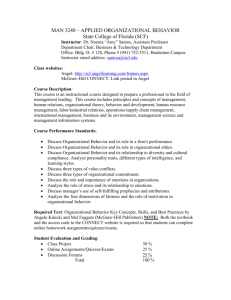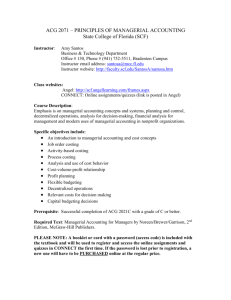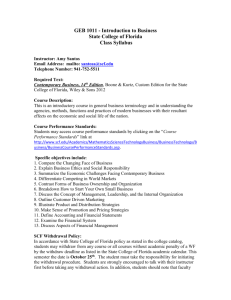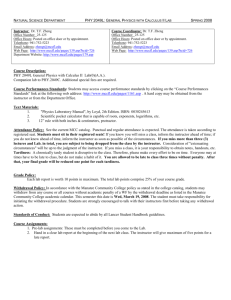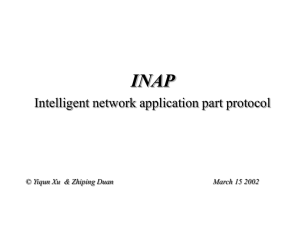FIN 3400 - State College of Florida
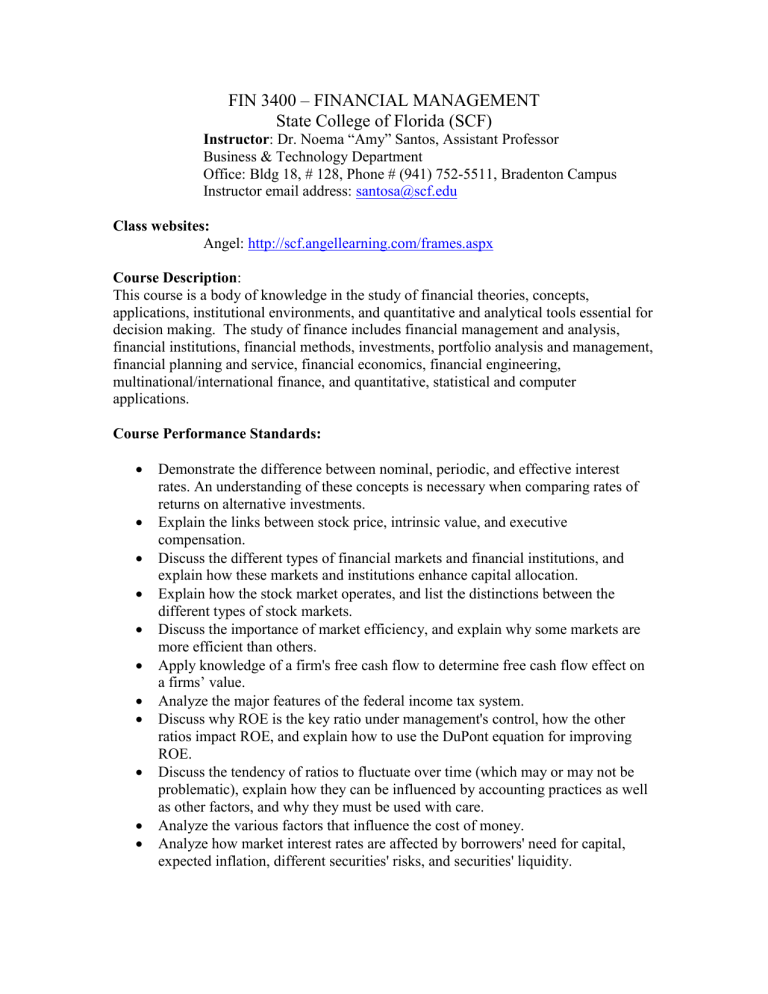
FIN 3400 – FINANCIAL MANAGEMENT
State College of Florida (SCF)
Instructor : Dr. Noema “Amy” Santos, Assistant Professor
Business & Technology Department
Office: Bldg 18, # 128, Phone # (941) 752-5511, Bradenton Campus
Instructor email address: santosa@scf.edu
Class websites:
Angel: http://scf.angellearning.com/frames.aspx
Course Description :
This course is a body of knowledge in the study of financial theories, concepts, applications, institutional environments, and quantitative and analytical tools essential for decision making. The study of finance includes financial management and analysis, financial institutions, financial methods, investments, portfolio analysis and management, financial planning and service, financial economics, financial engineering, multinational/international finance, and quantitative, statistical and computer applications.
Course Performance Standards:
Demonstrate the difference between nominal, periodic, and effective interest rates. An understanding of these concepts is necessary when comparing rates of returns on alternative investments.
Explain the links between stock price, intrinsic value, and executive compensation.
Discuss the different types of financial markets and financial institutions, and explain how these markets and institutions enhance capital allocation.
Explain how the stock market operates, and list the distinctions between the different types of stock markets.
Discuss the importance of market efficiency, and explain why some markets are more efficient than others.
Apply knowledge of a firm's free cash flow to determine free cash flow effect on a firms’ value.
Analyze the major features of the federal income tax system.
Discuss why ROE is the key ratio under management's control, how the other ratios impact ROE, and explain how to use the DuPont equation for improving
ROE.
Discuss the tendency of ratios to fluctuate over time (which may or may not be problematic), explain how they can be influenced by accounting practices as well as other factors, and why they must be used with care.
Analyze the various factors that influence the cost of money.
Analyze how market interest rates are affected by borrowers' need for capital, expected inflation, different securities' risks, and securities' liquidity.
Explain what the yield curve is, what determines its shape, and how you can use the yield curve to help forecast future interest rates.
Analyze the different features of corporate and government bonds.
Calculate a bond's yield to maturity, its yield to call if it is callable, and determine the “true” yield.
Analyze the different types of risk that bond investors and issuers face, and discuss how a bond's terms and collateral can be changed to affect its interest rate.
Required Text : CFIN3 + Aplia with CourseMate Access by Besley/Brigham, Cengage
Publishers . NOTE: Both the textbook and the access code to the Aplia website is required so that students can complete online homework assignments/quizzes/exams.
Student Evaluation and Grading :
Class Project
Discussion Forums
Online Assignments/Quizzes/Exams
Total
50 %
25 %
25 %
100 %
No single component of the class can be eliminated and/or substituted by scores from any of the other two. The final grade is a combination of scores on all components.
Course Policies and Procedures :
Email – Students are required to communicate with their instructor through Angel using their official SCF email address.
Chapter content and reading - Students must read the chapter before each week starts.
Class activities will focus on the discussion/achievement of learning objectives.
Class Project – A separate guide and rubric for the class project will be posted in Angel.
***All written assignments must follow APA Style guidelines as stated in the APA
Manual, 6 th
Edition.
Discussion Forums – Answers/discussions will be posted in the Angel forums and submissions will not be accepted after the deadline. Paper copies will not be accepted!
College Withdrawal Policy – In accordance with the State College of Florida policy, as stated in the college catalog, students may withdraw from any course, or all courses, without academic penalty, by the withdrawal deadline listed in the State College of
Florida academic calendar. This semester the withdrawal date is __________________.
Students should take responsibility to initiate the withdrawal procedure but are strongly encouraged to talk with their instructors before taking any withdrawal action. In addition, students should note that faculty may also withdraw students for violating policies, procedures or conditions of the class, as outlined in individual class syllabi, and such action could affect financial aid eligibility.
Instructor Withdrawal Policy – Students, who either miss class or do not complete any class activities during a two-week period, will be automatically withdrawn from class by the instructor.
